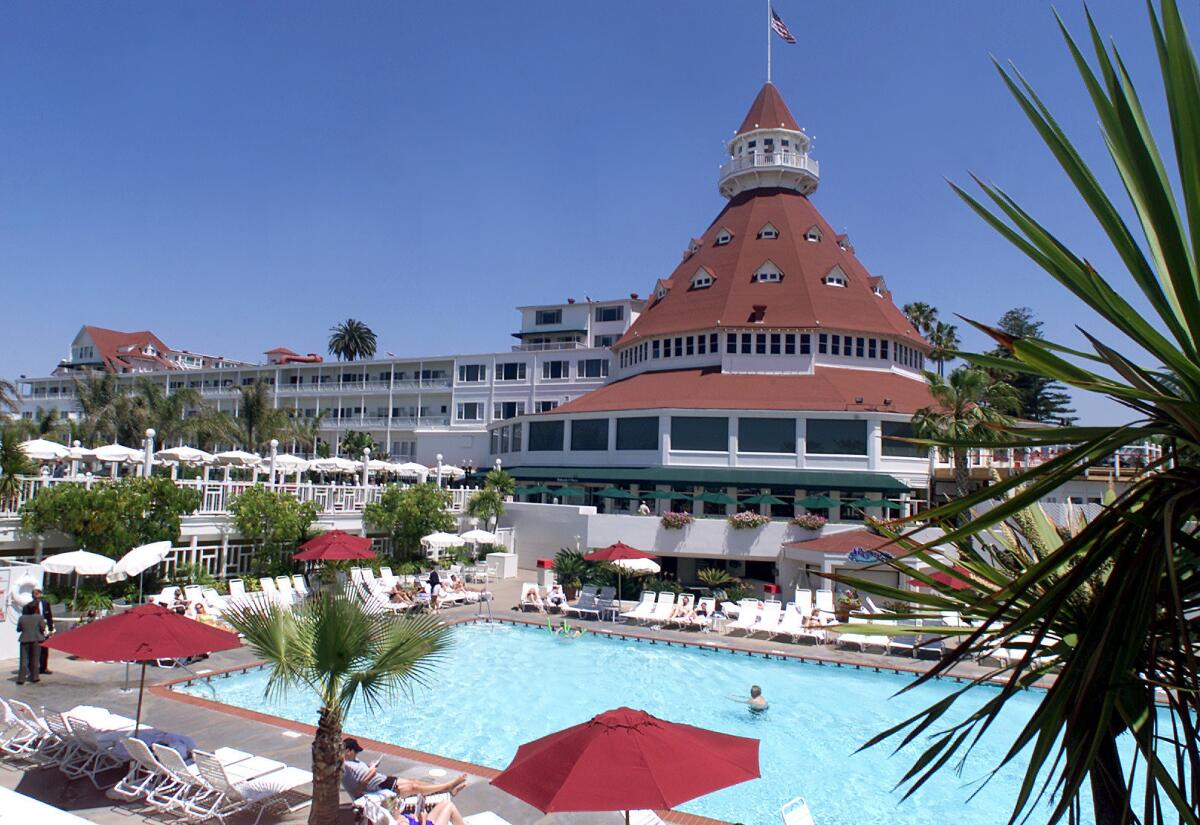5 things about the Chinese company that’s buying up U.S. luxury hotels

The Hotel del Coronado near San Diego is one of 16 hotels that will reportedly be acquired by Chinese firm Anbang Insurance Group.
- Share via
Chinese investment in U.S. trophy properties is soaring, and Beijing-based Anbang Insurance Group is providing some of the biggest fireworks.
A consortium led by the insurer has made an unsolicited bid for Starwood Hotels and Resorts Worldwide Inc., according to a statement Monday from Marriott International Inc., which is in the process of acquiring Starwood. Earlier, Anbang was reported to be offering $6.5 billion for hotels that include the Hotel del Coronado near San Diego.
RELATED: $14-billion bid for Starwood hotels puts Chinese firm Anbang in spotlight >>
Until a few years ago, Anbang was largely unknown in the U.S. Read on to find out more.
Anbang is very wealthy
Anbang, pronounced “ahn-bahn,” got its start in 2004 with $75 million and a single branch in Beijing. Since then, it has steadily increased in value. By 2009, the company had assets of $5.1 billion. Today it is one of the largest insurance groups in China, with $250 billion in assets, 30,000 employees and more than 35 million clients.
Its early investors were Shanghai Automotive Industry Corp., Chinese oil and gas company Sinopec and other large state-owned enterprises.
See the most-read stories this hour >>
It is well connected
Some have attributed the company's success to its strong political ties. Chinese media have attempted to publish reports on what power players are involved with Anbang, but some of those reports were taken offline shortly after being posted.
An investigation by the publication Southern Weekend found that those involved included Zhuo Ran, the granddaughter of China’s former “paramount leader” Deng Xiaoping; Zhu Yunlai, son of former premier Zhu Rongji; and Chen Xiaolu, son of Communist Party revolutionary military commander Chen Yi.
It is part of a larger wave of interest in U.S. properties
As China's economy slows, Chinese companies are looking to diversify their assets outside their home market. Even the government has encouraged companies to "go out." U.S. real estate is an especially attractive target since China’s economy was once driven by real estate and the topic is one companies know well, said William Yu, an economist with the UCLA Anderson School of Management.
Investments in the U.S. are also seen as more stable, as some fear that Chinese currency could depreciate, he said.
“If they invest in dollar assets, and if dollar assets appreciated, they would have additional gain on overseas investment,” Yu said.
Anbang likes to make a splash
Anbang first burst on the U.S. hospitality scene in 2014, when it bought the New York Waldorf-Astoria hotel for $1.95 billion, the second-largest Chinese acquisition of a U.S. hotel on record.
The company will reportedly pay $6.5 billion to buy Strategic Hotels and Resorts, a portfolio of 16 luxury hotels owned by New York private equity firm Blackstone Group. Its hotels include four Southern California properties: the Hotel del Coronado, the Ritz-Carlton Laguna Niguel, the Montage Laguna Beach and the Loews Santa Monica Beach. Blackstone had just completed its own acquisition of the portfolio in December.
It will have to fight for Starwood
Starwood is in the midst of an acquisition by Marriott, a move that would create the world's largest hotel company. The Marriott deal was valued at about $12.2 billion. The acquisition was announced in November, and shareholders from both companies are set to vote on the plan in two weeks.
The consortium led by Anbang has offered $76 in cash per Starwood share, as well as Interval Leisure Group Inc. common stock valued at about $5.50 per Starwood share.
Starwood said its board has not changed its recommendation to support the Marriott deal, but that it would “carefully consider” the outcome of discussions with the consortium. Starwood said it got a waiver from Marriott to speak with the consortium about the proposal. The waiver expires on Thursday.
Wes Golladay, a research analyst with RBC Capital Markets, said Anbang has a “legitimate chance” at buying Starwood because of the high premium it’s willing to pay.
“They’ve already demonstrated the ability to close a large transaction,” he said, referring to Anbang’s Waldorf-Astoria purchase. “I think it’s definitely going to be looked at very carefully.”
But he said the Marriott deal comes with less risk since it is already far along in the regulatory process.
Yingzhi Yang and Nicole Liu in The Times’ Beijing bureau contributed to this report.
For more business news, follow @smasunaga.
MORE BUSINESS NEWS
Video shows man urinating on Kellogg assembly line; investigation underway
Lloyd Shapley dies at 92; UCLA professor won Nobel for game-theory work
Why 'dynamic' pricing based on real-time supply and demand is rapidly spreading
Inside the business of entertainment
The Wide Shot brings you news, analysis and insights on everything from streaming wars to production — and what it all means for the future.
You may occasionally receive promotional content from the Los Angeles Times.









